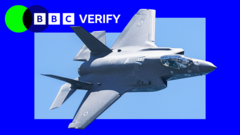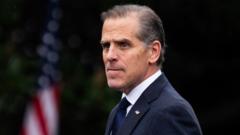As the ongoing Gaza conflict intensifies, UK Foreign Secretary David Lammy criticizes Israel's operations, prompting scrutiny of the UK's arms exports and intelligence sharing with Israel. Despite a partial arms export ban, loopholes concerning F-35 components remain, and the UK maintains its historical defense partnership with Israel amid calls for greater accountability.
UK Arms Trade Scrutinized Amid Gaza Conflict

UK Arms Trade Scrutinized Amid Gaza Conflict
Foreign Secretary David Lammy's condemnation of Israel's military actions raises questions about the UK's arms support to the nation, as calls for transparency grow.
The article text:
The Gaza War has prompted intense scrutiny over the UK's military relations with Israel, particularly regarding arms exports and intelligence sharing. UK Foreign Secretary David Lammy has openly condemned Israel's actions in Gaza, stating that Britain may need to "do more" if the Israeli government fails to alter its approach to the conflict. His remarks reflect a growing concern about the war's toll on civilians, particularly Palestinians killed at aid centers.
Since Israel launched its military operations in Gaza on October 7 following attacks, the spotlight has turned on the UK's role in supporting these actions. Although the UK is not one of Israel's leading arms suppliers—behind the US, Germany, and Italy—it has authorized arms export licenses valued at over £500 million since 2015, according to the Campaign Against Arms Trade (CAAT). The focus has primarily been on components produced in the UK for the advanced F-35 fighter jet, which has been extensively utilized by Israel during the conflict.
Despite some restrictions, notably the suspension of certain arms export licenses following the Labour Party's rise to power, components for the F-35 remain exempt. Critics, including Professor Anna Stavrianakis, highlight this exemption as a significant loophole that undermines the effectiveness of arms control measures.
The UK has also co-developed the Hermes drone, which Israel employs in combat operations. While the unarmed UK version, the Watchkeeper 450, differs from its armed Israeli counterpart, concerns persist about the implications of British involvement in these technologies.
Questions regarding the extent of UK intelligence cooperation with Israel are equally pressing. Lammy asserted that UK surveillance flights over Gaza aimed solely at locating hostages taken by Hamas do not involve military intelligence sharing. The UK's longstanding defense partnership with Israel, which includes joint training and capability development, remains intact despite evolving political rhetoric.
Israeli troops have also participated in UK-led military training programs, albeit on a limited scale. Defence officials have noted the importance of promoting compliance with international humanitarian law during these courses.
In a shift from prior policy, the UK government has shown an increased willingness to criticize Israel since the 2024 general election. Recent actions include the suspension of free trade agreement negotiations and support for arrest warrants against Israeli leaders, highlighting a desire for accountability regarding Israel's military conduct in Gaza.
As the death toll in Gaza stands alarmingly high, with figures exceeding 59,000 according to local health authorities, the need for transparency in the UK's relationship with Israel intensifies. Public calls for a detailed inquiry into this arms trade relationship continue to rise, raising vital questions about ethical international conduct during conflicts.
The Gaza War has prompted intense scrutiny over the UK's military relations with Israel, particularly regarding arms exports and intelligence sharing. UK Foreign Secretary David Lammy has openly condemned Israel's actions in Gaza, stating that Britain may need to "do more" if the Israeli government fails to alter its approach to the conflict. His remarks reflect a growing concern about the war's toll on civilians, particularly Palestinians killed at aid centers.
Since Israel launched its military operations in Gaza on October 7 following attacks, the spotlight has turned on the UK's role in supporting these actions. Although the UK is not one of Israel's leading arms suppliers—behind the US, Germany, and Italy—it has authorized arms export licenses valued at over £500 million since 2015, according to the Campaign Against Arms Trade (CAAT). The focus has primarily been on components produced in the UK for the advanced F-35 fighter jet, which has been extensively utilized by Israel during the conflict.
Despite some restrictions, notably the suspension of certain arms export licenses following the Labour Party's rise to power, components for the F-35 remain exempt. Critics, including Professor Anna Stavrianakis, highlight this exemption as a significant loophole that undermines the effectiveness of arms control measures.
The UK has also co-developed the Hermes drone, which Israel employs in combat operations. While the unarmed UK version, the Watchkeeper 450, differs from its armed Israeli counterpart, concerns persist about the implications of British involvement in these technologies.
Questions regarding the extent of UK intelligence cooperation with Israel are equally pressing. Lammy asserted that UK surveillance flights over Gaza aimed solely at locating hostages taken by Hamas do not involve military intelligence sharing. The UK's longstanding defense partnership with Israel, which includes joint training and capability development, remains intact despite evolving political rhetoric.
Israeli troops have also participated in UK-led military training programs, albeit on a limited scale. Defence officials have noted the importance of promoting compliance with international humanitarian law during these courses.
In a shift from prior policy, the UK government has shown an increased willingness to criticize Israel since the 2024 general election. Recent actions include the suspension of free trade agreement negotiations and support for arrest warrants against Israeli leaders, highlighting a desire for accountability regarding Israel's military conduct in Gaza.
As the death toll in Gaza stands alarmingly high, with figures exceeding 59,000 according to local health authorities, the need for transparency in the UK's relationship with Israel intensifies. Public calls for a detailed inquiry into this arms trade relationship continue to rise, raising vital questions about ethical international conduct during conflicts.





















